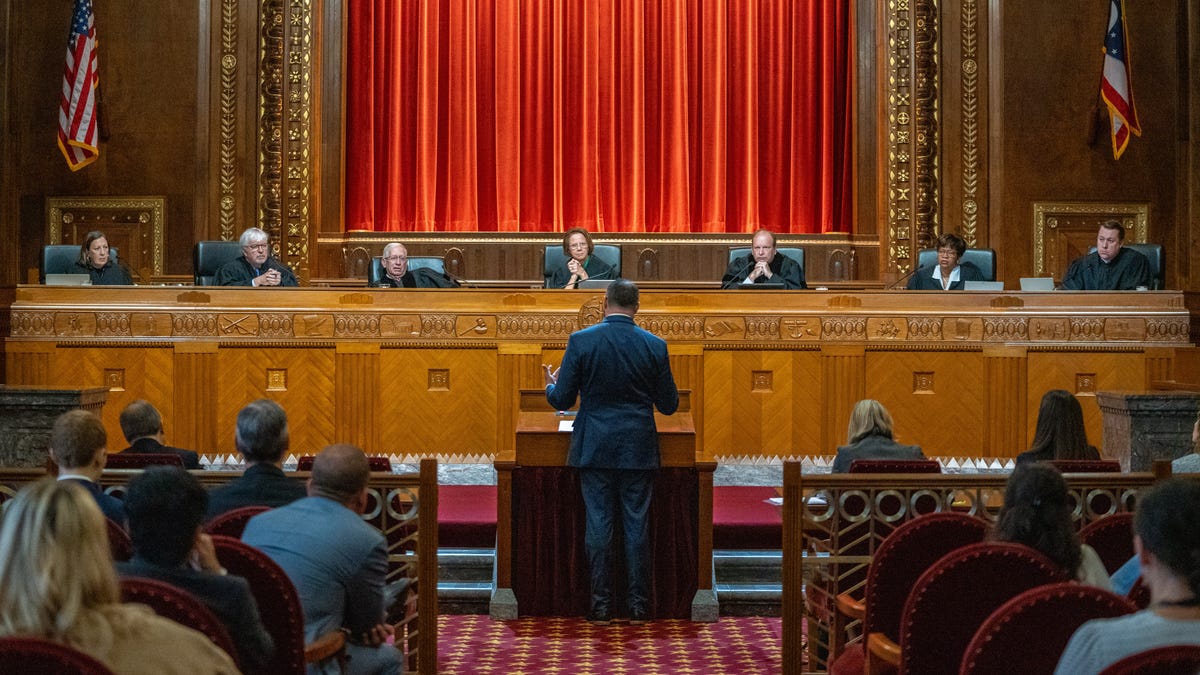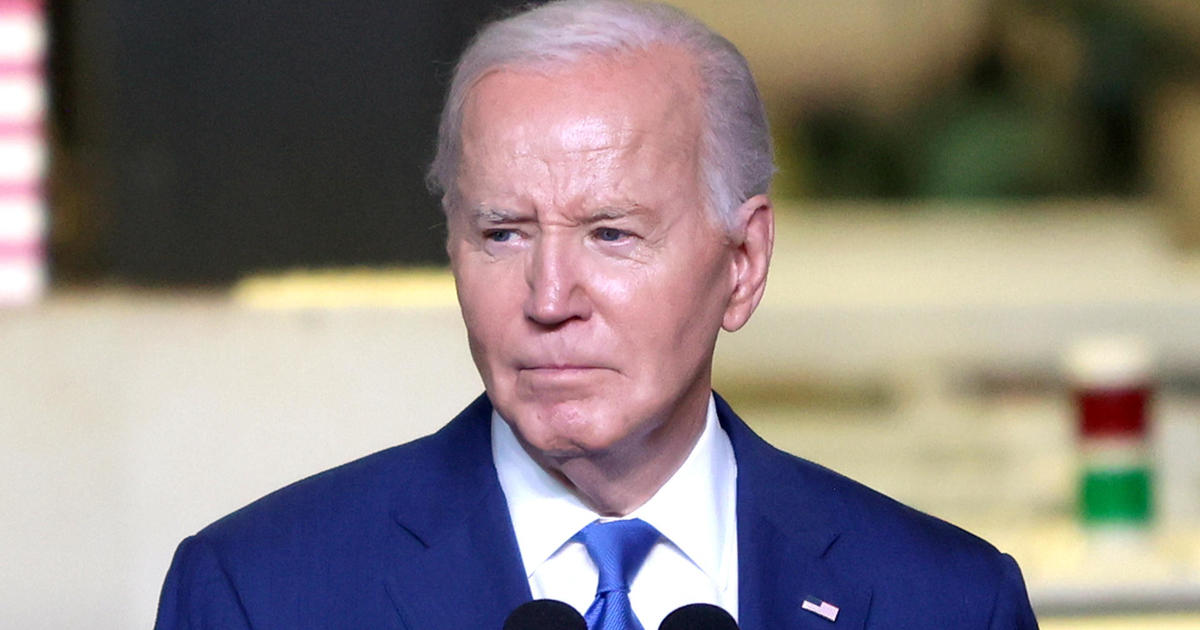World
Italian PM Meloni ally fires back against criticism says policies the same but 'Europe has changed'
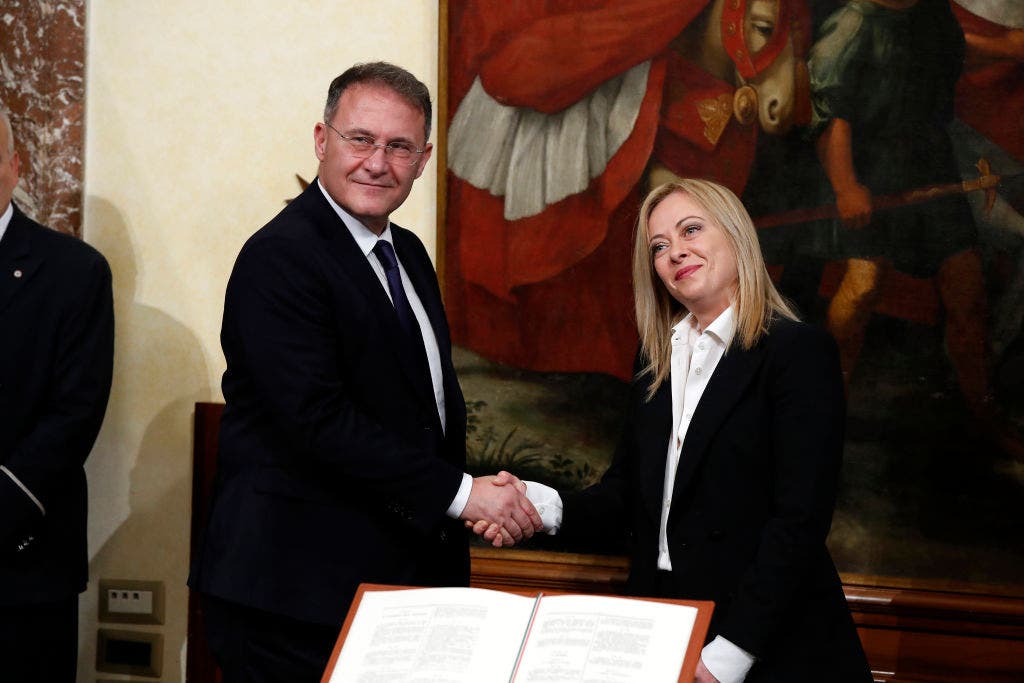
FIRST ON FOX – A close ally to Italian Prime Minister Giorgia Meloni told Fox News Digital that criticism against her for abandoning policies on illegal migration and other issues is unfounded.
Italian Vice Minister of Foreign Affairs Edmondo Cirielli told Fox News Digital, “Giorgia Meloni hasn’t changed, Europe has changed.” Cirielli is the co-founder and national coordinator of Meloni’s party, the Fratelli D’Italia Party.
He said Italy is inspiring the European Union president to follow its strong conservative stances.
MELONI’S SHIFT FROM ANTI-GLOBALIST TO PRO-EUROPE, BIDEN BUDDY INFURIATES BASE: ‘WILL NOT VOTE FOR HER ANYMORE’
The leader of Fratelli d’Italia, Giorgia Meloni, in Rome on Sept. 22, 2022 for the closing of the election campaign for the general election in Italy on Sept. 25, 2022. (Getty Images)
He said that the Europe of Ursula von der Leyen is paying attention to Italy’s policies and “is listening to Italy’s reasons. Italy has always wanted nations to be stronger in Europe and is leading the rest of the European Union on this. Von der Leyen herself is accompanying Meloni in her action against illegal immigration. They have already intervened in Egypt and Tunisia. We will soon do it in Libya too.”
He added “among other things, there are European elections in a few months and the conservative party led by Giorgia Meloni, the European Conservative Party led by Giorgia Meloni, will give a new direction to this Europe. And the European Parliament itself, the European People’s Party itself, will have to take into account the problems that exist today and that Giorgia Meloni identified during her electoral campaign.”
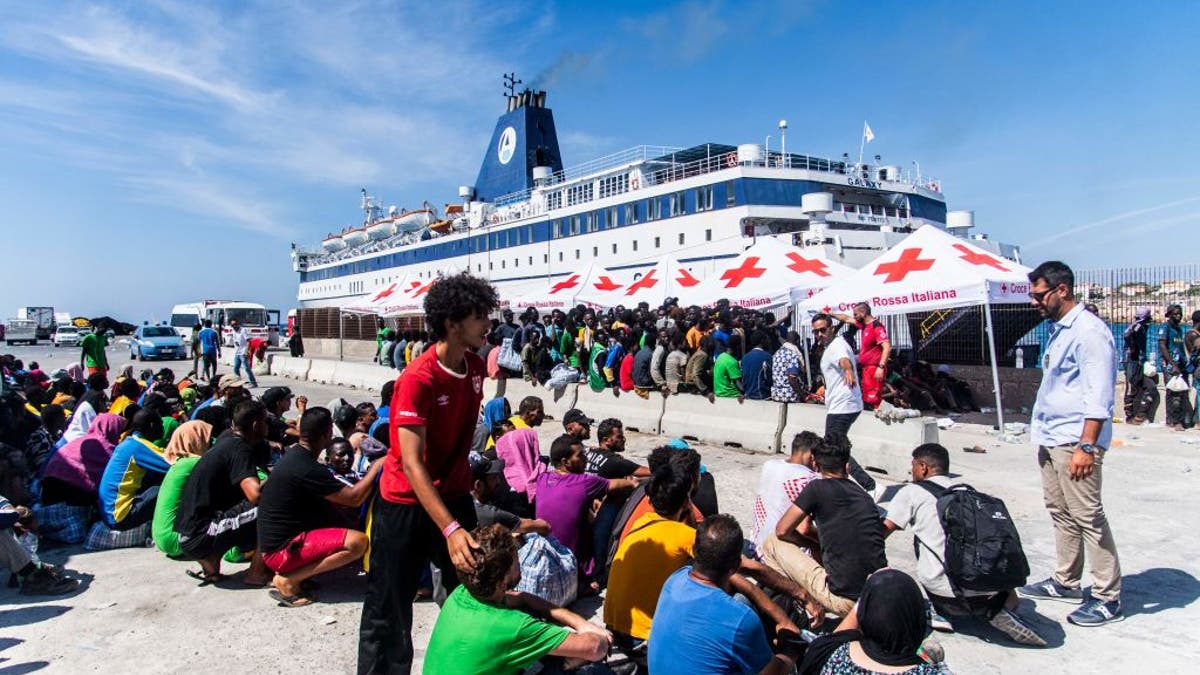
Migrants from a migrant housing center on the Italian island of Lampedusa are guided by a security official on Sept. 14, 2023 as they prepare to board the ship “Galaxy”, bound for the Sicilian town of Porto Empedocle. The island struggled to cope with a surge in migrant boats from North Africa after numbers peaked at 7,000 people, equivalent to the entire local population. (Photo by ALESSANDRO SERRANO/AFP via Getty Images)
Birth rates in Italy have dropped to a record low in 2023 with a 15th consecutive annual decline. In 2023, Italy recorded 379,000 births, a 3.6% decline from 2022.
Cirielli said the problem does not only concern Italy, but concerns all of Western Europe. In its 2024 budget, Italy earmarked around 1 billion Euros (approximately $1.1 billion) for several measures aimed at addressing Italy’s demographic crisis.
“We are implementing a series of policies aimed at supporting births, birth rates and young couples, both on an economic and financial level, and this is obviously also a social phenomenon. It’s about changing your mindset and understanding that life is an opportunity and a joy for everyone,” the deputy foreign minister said.
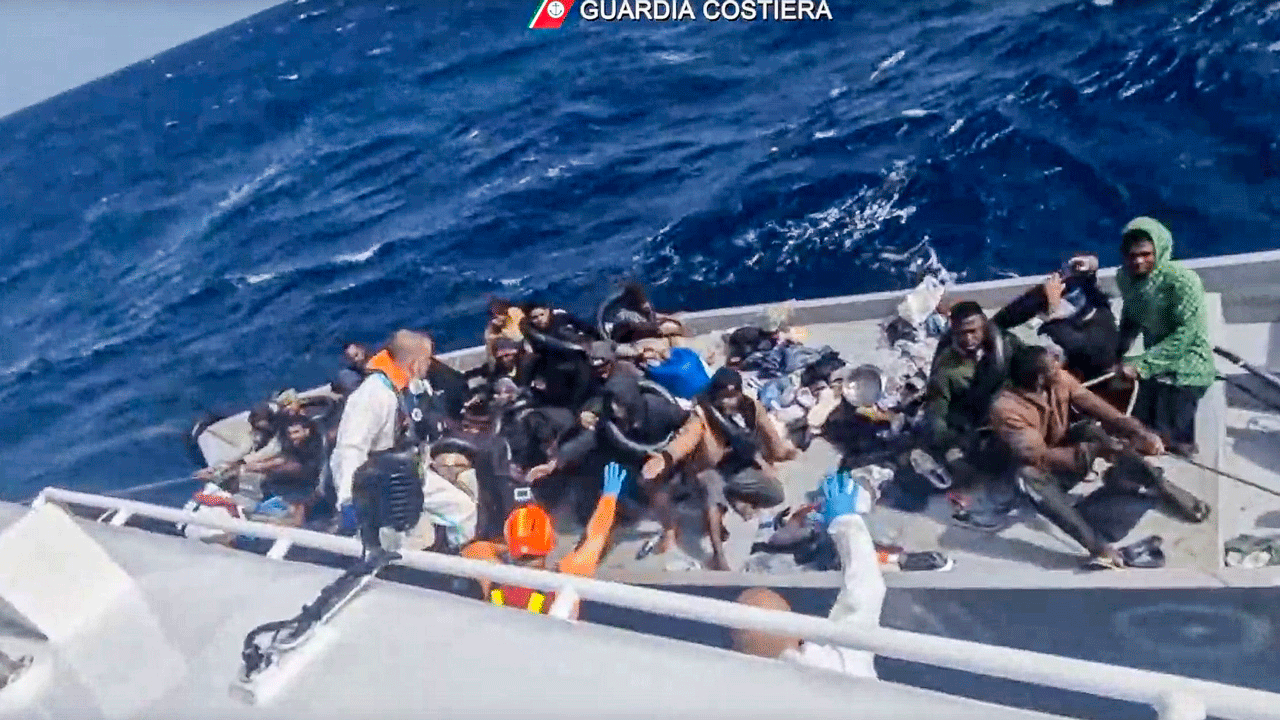
In this image taken from a video released by the Italian Coast Guard on Thursday, April 11, 2024, a boat with migrants is approached by a rescue operation off the island of Lampedusa in the Mediterranean Sea. The Italian Coast Guard rescued 22 people and recovered nine bodies on Thursday, April 10, 2024, after a smugglers’ boat capsized in storm about 30 miles south of the island of Lampedusa. (Photo: Italian Coast Guard.)
The journey from North Africa to Italy has become one of the busiest migration routes with data showing migrant arrivals jumping 50% in 2023 from the previous year.
Cirielli accompanied Prime Minister Meloni last week on her fourth visit to Tunisia in a year when they signed new accords as part of Italy’s “Mattei Plan” for Africa.
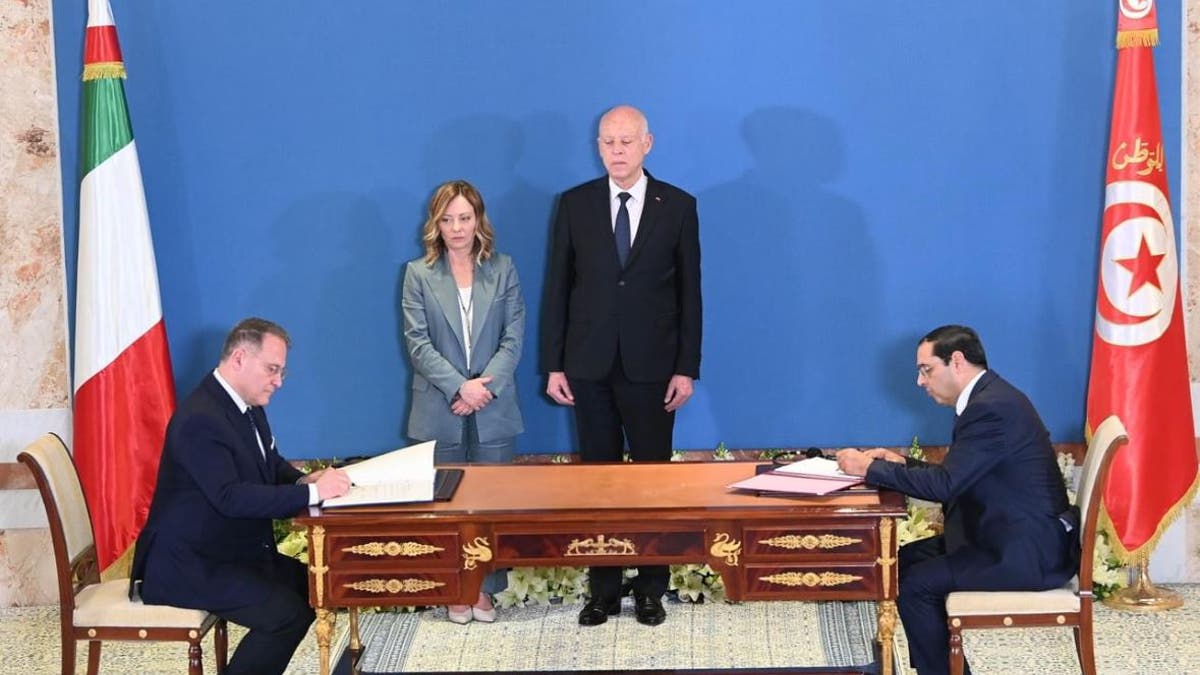
Italian Deputy Minister for Foreign Affairs and International Cooperation, Edmondo Cirielli, left, signs accords along with Italian Premier Giorgia Meloni and Tunisian President Kais Saied, center right. (Photo: Gerardo Antelmo/ Office of the Vice Minister Edmondo Cirielli.) (Gerardo Antelmo/ Office of the Vice Minister Edmondo Cirielli)
“We are faced with an epochal fact that does not only concern Italy,” said Cirielli.
MORE THAN 63,000 MIGRANTS HAVE DIED OR GONE MISSING SINCE 2014, UN AGENCY REPORTS
The Mattei Plan seeks to tackle education and training, agriculture, health, water and energy development while aiming to make Italy an energy hub to transport natural gas supplies from Africa to the rest of Europe.
“We are intervening, first of all, with agreements with North African countries to prevent the departures from these coasts, but above all, we are trying to come to the places of origin of the migration. They are trying to help development and at the same time also provide legal channels of migration. Because the real problem is not migration itself and rather it is the criminal organizations that are behind the trafficking of migrants which is creating a new slave trade.”
He added, “This globalization is becoming very powerful on a financial level, exploiting this trafficking and in this way destabilizing Africa, becoming criminal organizations that launder this money from international trafficking, funneling it into drugs, armaments and also to often support the causes of terrorist organizations.”
Under Italy’s rotating stewardship, the G-7 foreign ministers met last week on the Italian resort island of Capri with calls for new sanctions against Iran over its attack against Israel.
“Italy, with the presidency of the G-7, has condemned Iran’s action and knows well that Iran is carrying out a destabilizing action in the Arabian Peninsula in the Middle East, but it is equally true that we do not need an escalation… Israel’s bombing of a consular office, the diplomatic headquarters, was also a risky act. On the other hand, all of the G-7 noted that Iran’s response was a response, this time a balanced, moderate response compared to the episode itself.”
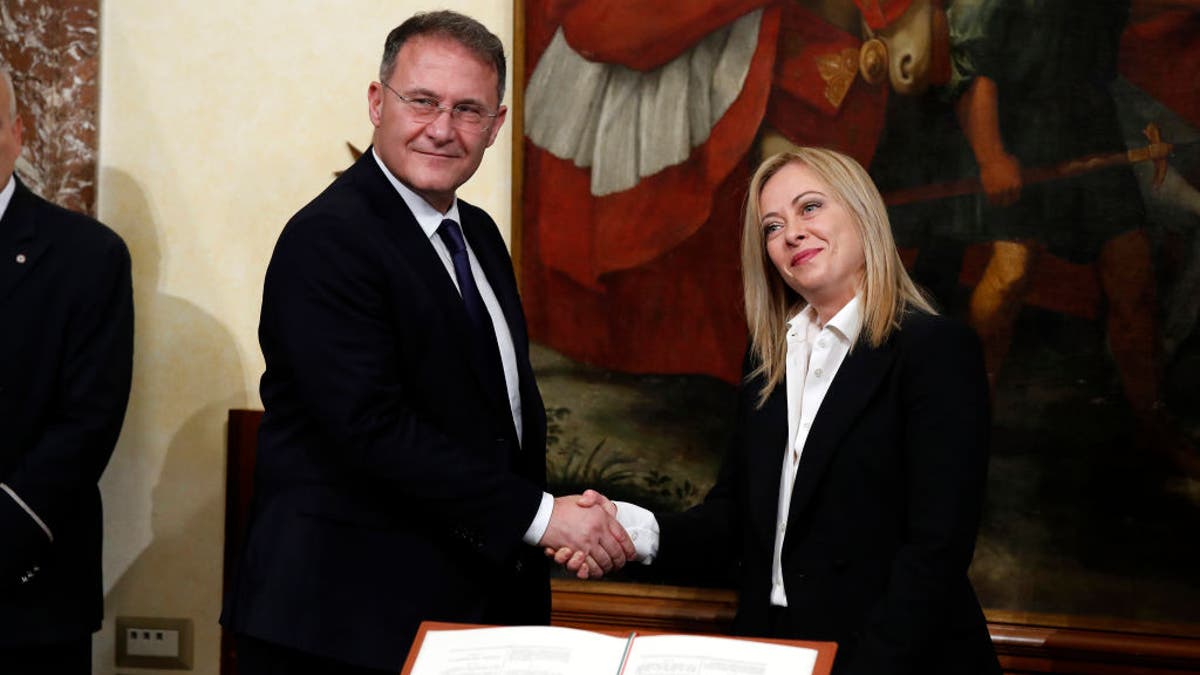
Italian Prime Minister Giorgia Meloni and Italian Undersecretary of the Ministry of Foreign Affairs and International Cooperation Edmondo Cirielli during the ceremony of Oath of the Undersecretaries at Palazzo Chigi. Rome (Italy), November 02nd, 2022 (Photo by Massimo Di Vita/Archivio Massimo Di Vita/Mondadori Portfolio via Getty Images)
Cirielli added “It was understood that the Iranian government does not want an escalation and therefore everyone agrees, in the G-7, at the invitation following the lead of Biden and Giorgia Meloni and neighbors who are close and ready to support,Israel, especially Israel’s right to defend itself and Israel’s right to exist. But we must carry forward a de-escalation and prevent a regional war from erupting from this issue in Gaza.”
In December, Italy withdrew from China’s Belt and Road Initiative which intended to rebuild the Silk Road to connect China with Asia and Europe by expanding China’s infrastructure spending on roads and shipping routes.
Cirielli says the move to withdraw is not an interruption between the relationship of Italy and China but in the best interest of Italian trade.
CLICK TO GET THE FOX NEWS APP
“It was a mistake by the Conte Government and the center-left governments that preceded us to make a political agreement because this seemed inconsistent with the alliance of the North Atlantic Treaty and also with the European Union…we terminated this agreement at the natural deadline and are establishing a new economic-social partnership, as like France and Germany have known. Therefore, there is not an interruption of relations, but a different modulation based on ancient, thousand-year-old relations almost only between the Italic peoples and the Chinese peoples, based absolutely on good dialogue, on profitable trade for both.”
The “Opposition had said that it is not wrong to have diplomatic relations or economic relations with China, it is wrong to have a political relationship that is underlying the agreement launched by China towards the world,” he concluded.

World
A Satellite View of Israel’s New Front in Gaza

New satellite imagery taken after Israeli forces pushed into Rafah shows widespread damage to the southern Gaza city — including large areas of flattened structures — and clusters of Israeli armored vehicles.
Source: Satellite imagery from Planet Labs
Imagery captured on Tuesday morning by Planet Labs, a commercial satellite company, shows damaged buildings reaching more than two miles into the territory near Rafah’s border crossing with Egypt. Israel seized that crossing this week.
Photos and videos released by the Israeli military in the same area show tanks in the vicinity of the crossing at a similar time on Tuesday morning.
While it is not possible to know exactly what caused the damage shown in the satellite imagery, much of what can be seen is consistent with the aftermath of clearing operations and other Israeli ground operations elsewhere in the Gaza Strip.
Source: Satellite imagery from Planet Labs
Israel says Rafah is Hamas’s last stronghold, and a critical gateway for arms shipments smuggled into Gaza from Egypt. It says it is determined to make sure the militants who were behind the Oct. 7 attacks on Israel no longer pose a threat.
But Rafah has also become a refuge for more than a million Palestinians who have fled Israeli bombardment in other parts of Gaza, and there is broad concern that a full-scale invasion might prove catastrophic.
Beyond that, Rafah is also home to one of the two main entry points for the vast majority of aid that has managed to enter Gaza during the war. Since the latest Israeli military operation began, no fuel or aid has made it through, according to Scott Anderson, the deputy director of UNRWA, the main U.N. aid agency in Gaza.
Source: Israeli military announcements
On Monday, the Israeli military ordered about 110,000 people to evacuate parts of Rafah. Thousands left the city, the Palestine Red Crescent Society said, which reported “escalating Israeli airstrikes” in areas east of Rafah.
Local health authorities warned of a “significant increase” in the death toll because of intense Israeli bombardment across Gaza, particularly in Rafah. The bodies of 58 people killed in Israeli strikes had arrived at Rafah’s Abu Yousef al-Najjar Hospital since Sunday, Dr. Marwan al-Hams, the hospital’s director, said Tuesday.
World
US reputation declines globally, immigration concerns grow in Europe: study
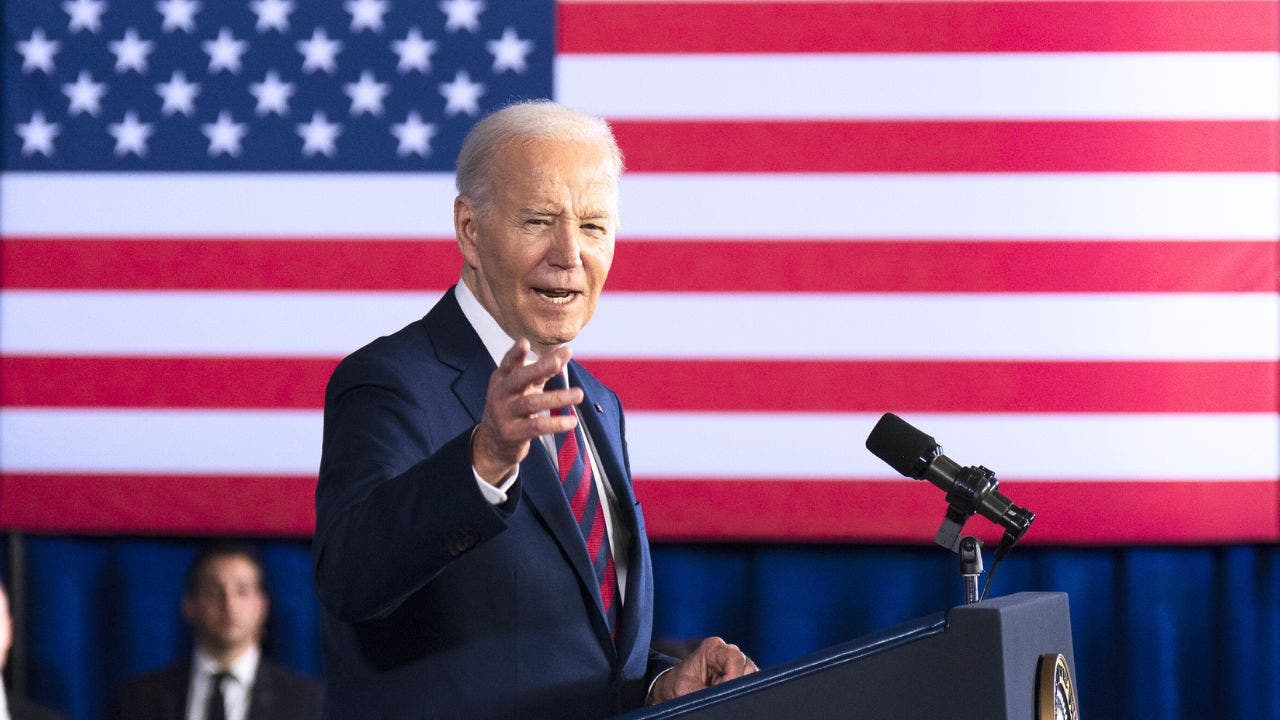
The reputation of the U.S. globally has taken a hit over the last year and the majority of citizens believe election integrity threatens the country’s democracy, while immigration is now one of the top concerns among Europeans, according to a global study published on Wednesday.
The drop in positive attitudes towards the U.S. is particularly stark in the Muslim-majority countries surveyed, including Indonesia, Malaysia, Turkey, Morocco, Egypt, and Algeria, as well as in European countries such as Switzerland, Ireland, Ukraine and Germany.
Still, the U.S. remains positively viewed globally, although Russia and China are now seen as positively as the U.S. in most Middle East and North African countries surveyed, according to the study.
BIDEN PLAN TO EXTEND OBAMACARE ELIGIBILITY TO ILLEGAL IMMIGRANTS GETS PUSHBACK IN CONGRESS: ‘MADNESS’
Biden speaks at the Pieper-Hillside Boys and Girls Club in Milwaukee, Wisconsin, on March 13, 2024. The reputation of the U.S. has suffered globally between the Spring of 2023 and the Spring of 2024. ( Sara Stathas/Bloomberg via Getty Images)
In Europe, countries have witnessed a sharp increase in the share of people who say that “reducing immigration” should be a top government priority as concerns about climate change fall, according to a global study published on Wednesday. About 5.1 million immigrants entered the EU from non-EU countries in 2022, an increase of around 117%, or 2.7 million, compared to 2021, European data shows.
Germany was in the lead with 44% when it came to people wanting their government to focus on reducing immigration, followed by Ireland and France.
The study, called the Democracy Perception Index (DPI) is one of the world’s largest annual studies on how people perceive the state of democracy in their respective countries and consisted of 63,000 interviews from people across 53 countries. It was conducted by the Denmark-based think tank Alliance of Democracies Foundation and the research group Latana. It did not provide a reason for the U.S. reputation decline.
The DPI found that faith in democracy has remained high across the globe over the past six years with 85% of those polled saying that it’s important to have democracy in their country.
However, governments don’t always live up to people’s expectations. While 58% of respondents were satisfied with the state of democracy in their country, the remainder were not.
In the U.S., 60% of respondents said that unfair elections and/or election fraud threatens the country’s democracy, while about 77% said that corruption is a threat to democracy.
LESS THAN 1 IN 4 AMERICANS HAVE FAVORABLE OPINION OF FEDERAL GOVERNMENT: POLL
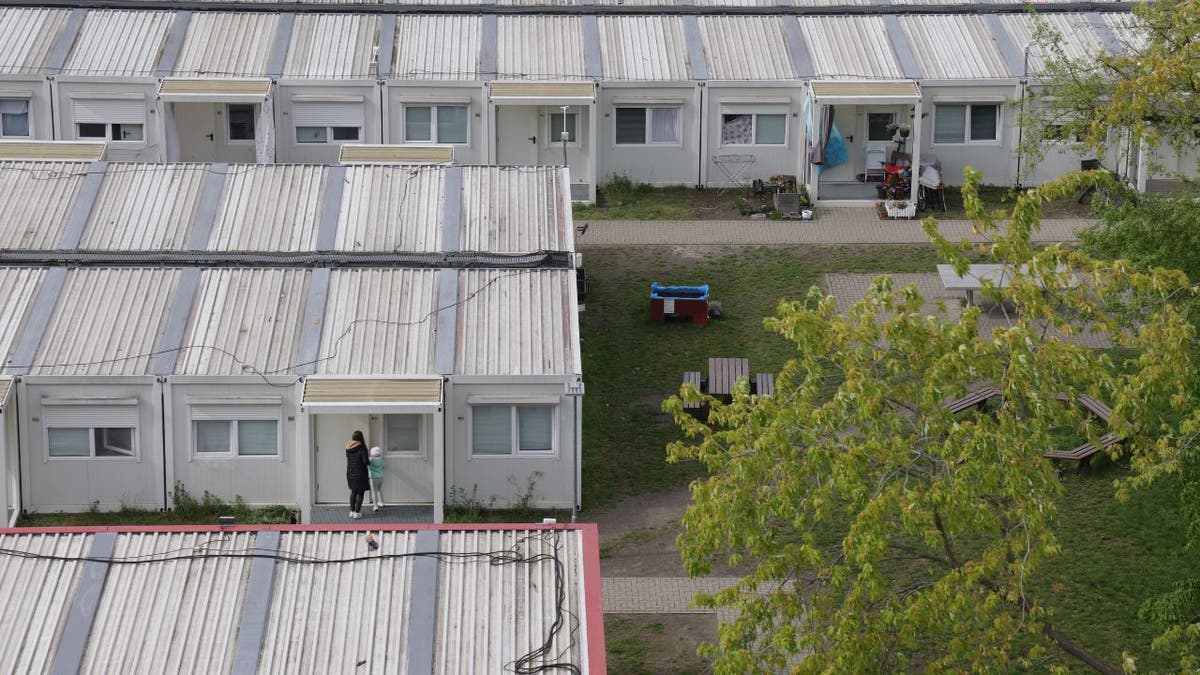
A container settlement that provides housing for refugees stands in Kreuzberg district on April 16, 2024 in Berlin, Germany. Immigration is now a major concern among Germans. ( Sean Gallup/Getty Images)
The study said dissatisfaction was not limited to non-democratic countries. It was also prevalent in the U.S., Europe and in other places with a long democratic tradition.
In Europe, about a third of Hungarians believe they live in a democracy.
About half of the people around the world, in both democratic and non-democratic countries, feel that their government is acting only in the interest of a small group of people. Over the past four years, this perception has remained highest in Latin America, lowest in Asia and has steadily increased in Europe since 2020 – particularly in Germany, the study shows.
Israel, Ukraine and Russia have all experienced a “rally around the flag” effect, with the public perception that the government is acting in the interest of the majority of the people increasing rapidly after the start of their respective conflicts. In Ukraine, however, this perception declined sharply after it peaked in 2022.
Anders Fogh Rasmussen, the chair of the Alliance of Democracies Foundation and former Danish Prime Minister, says that these figures are an eye-opener and the trend shows there is a risk of losing the Global South to the autocracies.

The DPI found that faith in democracy has remained high across the globe over the past six years with 85% of those polled saying that it’s important to have democracy in their country. (PAUL J. RICHARDS/AFP via Getty Images)
“Around the world people want to live under democracy but these figures are a wake-up call for all democratic governments,” Rasmussen said.
“Defending democracy means advancing freedom around the world, but it also means listening to voters’ concerns at home… We are witnessing an axis of autocracies forming from China to Russia to Iran. We must act now to make freedom more attractive than dictatorship and unite through an alliance of democracies to push back against the emboldened autocrats.
War and violent conflict is increasingly seen as the most important global challenge, followed by poverty and hunger, and climate change. The last year has seen a global rise in the share of people who say that migration and terrorism are among the world’s largest challenges, particularly among Europeans.
At the national level, most people want their governments to focus more on poverty reduction, corruption and economic growth.
However, there are strong regional differences in priorities: Europeans and Americans are much more likely to want their government to prioritize improving healthcare, fighting climate change and reducing immigration than countries in Asia and Latin America, where fighting corruption and promoting growth are seen as more important.
Globally, 33% of those surveyed believe climate change is one of the world’s three main challenges, but only 14% say fighting it should be among the top three priorities for their government.
Immigration is likely to play a major role in next month’s European elections where nationalist parties are expected to make significant gains.
The Associated Press contributed to this report.
World
Brussels agrees to send €3bn from frozen Russian assets to aid Ukraine

Diplomats agreed the controversial plans at a meeting on Wednesday – but some say they don’t go far enough.
EU diplomats agreed Wednesday to use income from frozen Russian state assets to aid Ukraine – paving the way for the war-torn country to get around €3 bn for arms purchases and reconstruction before the summer.
Since the full-scale invasion of 2022, €210 billion in assets of the Moscow central bank have sat frozen within the bloc – chiefly at the Euroclear depositary in Belgium.
The deal was agreed “in principle” at a regular meeting of national representatives, according to a tweet by Belgium, currently chairing talks in the European Council.
Brussels has long touted using the interest from those funds, estimated at around €3bn per year, for Ukraine’s reconstruction costs – and later extended its plans to cover Kyiv’s military expenditure.
The plan – which also has backing from the group of seven leading industrialised democracies – comes as Ukraine hopes to turn the tide in an increasingly desperate military campaign, bolstered by €89bn recently agreed by the US Congress.
But Ukrainian ministers have said Brussels needs to go further than merely scooping up interest payments – and fully confiscate Moscow’s assets to ensure the aggressor pays for the cost of war.
Officials from EU countries and the European Central Bank have expressed concerns that seizing assets outright might set an unhelpful precedent or harm the euro’s reputation as a safe currency.
Talks were also held up by concerns over how many of the assets would be retained by Euroclear as an administration fee, a figure that was originally as high as 13%, as well as Belgium’s right to tax the profits gained by the Brussels-based securities depository.
Belgian Prime Minister Alexander De Croo has already promised to send some €1.5bn directly to Ukraine, though that appears to be a result of applying existing corporate tax law to the unexpected windfall Euroclear gains by having frozen central bank assets on its books.
The final deal allows Euroclear to keep a provisional buffer worth 10% of the profits, in case of litigation over the funds. It can also keep 0.3% as an incentive, while 90% of the funds will be sent via the European Peace Facility to help Ukraine buy weapons.
Commission President Ursula von der Leyen previously suggested Ukraine could receive the first funds under the mechanism by July – but the calculation will be backdated to February, when Euroclear formally segregated the assets.
Ambassadors today also formally agreed on the reforms Ukraine will have to make to receive funds from a separate €50bn facility of EU grants and loans.
UPDATE (8 May, 17:00 CET): adds clarification regarding litigation buffer.
-

 Politics1 week ago
Politics1 week agoHouse Republicans brace for spring legislative sprint with one less GOP vote
-

 World1 week ago
World1 week agoAt least four dead in US after dozens of tornadoes rip through Oklahoma
-

 Politics1 week ago
Politics1 week agoStefanik hits special counsel Jack Smith with ethics complaint, accuses him of election meddling
-

 Politics7 days ago
Politics7 days agoThe White House has a new curator. Donna Hayashi Smith is the first Asian American to hold the post
-

 Politics1 week ago
Politics1 week agoAnti-Trump DA's no-show at debate leaves challenger facing off against empty podium
-

 News1 week ago
News1 week agoAs student protesters get arrested, they risk being banned from campus too
-

 News1 week ago
News1 week agoVideo: Police Arrest Columbia Protesters Occupying Hamilton Hall
-

 World1 week ago
World1 week agoNine on trial in Germany over alleged far-right coup plot


